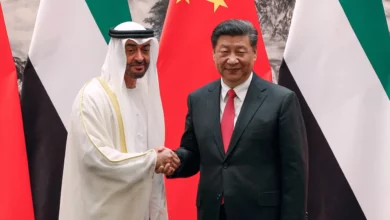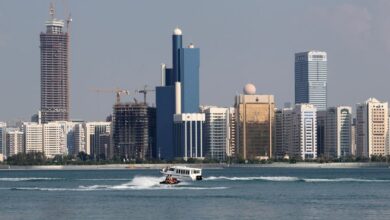Wary of the Muslim Brotherhood's growing influence in the Arab world, the United Arab Emirates is clamping down on Islamists, anxious they could be emboldened to challenge a government that has weathered "Arab Spring" uprisings unscathed.
Long confined to the margins of the political scene or thrown in prison to ensure they stayed that way, Islamists have emerged as key actors in Tunisia, Libya and Egypt following the overthrow of their autocratic rulers.
Egypt's Muslim Brotherhood now holds more seats than any other party in parliament and has fielded a candidate for the presidency, and the Islamist Ennahda party won Tunisia's first free election last year. Islamists in Libya have also strengthened their hand after Muammar Qadhafi's downfall.
These successes have energized Islamists in the UAE, a top oil exporter whose relationship with political Islam is long and fractious. Having staved off unrest at the height of the region's turmoil, the government is making sure dissent does not take root on its soil.
"The pressure on us is increasing," said Mohamed al-Siddiq, one of six members of Islamist group Al-Islah (Reform) who were stripped of their citizenship in December for committing "acts threatening the national security of the UAE".
"They say we represent the Muslim Brotherhood and we'll do what they did in Egypt, that we want to take power and grab seats and rule," said Siddiq. "That's not true".
Like other activists in the UAE, Islamists say all they want is more civil rights and greater power for the Federal National Council, a quasi-parliamentary body that has no legislative authority.
No one is openly questioning the UAE rulers' right to rule.
But government officials reject the idea that what's at stake here is anything but political power – not religious freedom, civil rights or democracy. They are keenly aware that Islamists are the only group with any potential to rally serious opposition among the wider population, analysts and diplomats say.
"Emiratis are very religious, and there are quite a few that do sympathize with the Brotherhood and what they stand for," said a diplomatic source in Abu Dhabi.
Earlier this month, Siddiq and the five other Islah members were arrested for refusing to seek alternative citizenship and put in jail, their lawyer said.
"Islam has a fundamental place in our society… But we cannot permit the activities of those who would seek to use religion to create division and dissension or to challenge the structures and policies of our state," said an Emirati source close to the government.
Brotherhood bogeyman
The government is not the only one who remains unconvinced.
"Let's assume the Brotherhood just want an elected parliament, not a change of rulers… the only organized group here with one voice is the Muslim Brotherhood, so they will win 100 percent," said Emirati columnist Ahmed al-Amiri.
"When you win, will you leave the laws unchanged or will you proceed to amend them according to your own vision?"
His concerns were echoed by Dubai's outspoken police chief Dhahi Khalfan, who warned that the Muslim Brotherhood was plotting to take over all Gulf states by 2016.
UAE Islamists dismiss the accusations as fear-mongering by the security services to turn Emiratis against them.
"I think this Brotherhood bogeyman is more a tool used by the security apparatus to intimidate people than it is a popular fear," said Saleh al-Dhufairi, the general manager of the Holy Koran Foundation in the northern emirate of Ras al-Khaimah, where Islamists have a stronger presence than in UAE capital Abu Dhabi or in the business hub, Dubai.
Dhufairi was recently detained for "provoking strife" after criticizing the UAE's state security services on Twitter. Banned from preaching years ago, he says he was forced into retirement and his sons cannot get the security clearance they need to work in government ministries.
Loyalty test
The Muslim Brotherhood has been present in the UAE since its early days and was once seen as a useful counterweight to left-wing and nationalist thought. Many Islamists blame the unraveling of their relationship with the UAE's rulers on the example set by Egyptian security services, who rounded up and imprisoned hundreds of Islamists.
What the UAE says it is most troubled by are the links Islamists at home have with those who are abroad, even if their ties really are no more than personal, or on the level of shared method and mentality, as Islah maintains.
"The UAE is built on the principle of promoting harmony and tolerance between people of all faiths, regardless of their origins," said the Emirati source close to the government.
"(We cannot) overlook the activities of any organization that disagrees with this approach, or which seeks to promote allegiance to an external authority, whether religious or otherwise."
The UAE's recent treatment of Islamists is not unlike measures it took in the 1970s and 80s against Arab nationalists, whose ideological orientation was towards Egypt, said Emirati analyst Mishaal al-Gergawi.
"I think it's the transnational element, I don't think they would be less worried if it were a secular group," he said.
Generous subsidies and cradle-to-grave handouts have helped shield the UAE from the revolutionary currents coursing from North Africa to Bahrain. But analysts ask for how long this will keep the tide at bay.
UAE Islamists' loyalty was put to the test earlier this year, when Khalfan was in the eye of an unusually public spat with the Egyptian Brotherhood.
Sheikh Yusef al-Qaradawi, an Egyptian former Brotherhood member, rapped the UAE for expelling around 30 Syrians who refused to disperse after an unlicensed protest against President Bahsar al-Assad outside their consulate in Dubai.
He also denounced the decision to revoke the six Islamists' citizenship.
That provoked a swift response from Khalfan, who said the cleric should not meddle in UAE affairs, suggesting the Muslim Brotherhood was trying to sow discord in the UAE and that Qaradawi could be held accountable for causing any unrest.
Muslim Brotherhood spokesman Mahmoud Ghozlan said in Egypt the group would act against the UAE if it tried to do anything against Qaradawi, without giving specifics about what it would do.
UAE Islamists were seen to have wasted a chance to demonstrate allegiance to their country because they did not defend Khalfan or denounce Ghozlan's and Qaradawi's comments.
"Their silence was an indication of the confusion of their loyalty," wrote columnist Mohamed al-Hamadi in Al-Ittihad newspaper. "The opportunity was there for the Emirati Muslim Brotherhood to deny the spokesperson's attack and prove loyalty to the UAE, but unfortunately, the opportunity was not seized."
Faced with the sudden demise of former allies and rapid rise of potentially hostile groups in its neighborhood, the UAE, whose livelihood relies on hosting expatriates from all over the world in their millions, is walking a thin line.
"What we don't want is conflict between nationalities, or religions or ideologies, or people bringing here the political arguments or conflicts they have in their countries of origin," said the Emirati source close to the government.
"In a multi-national country such as the UAE, that would be a recipe for importing unrest."




